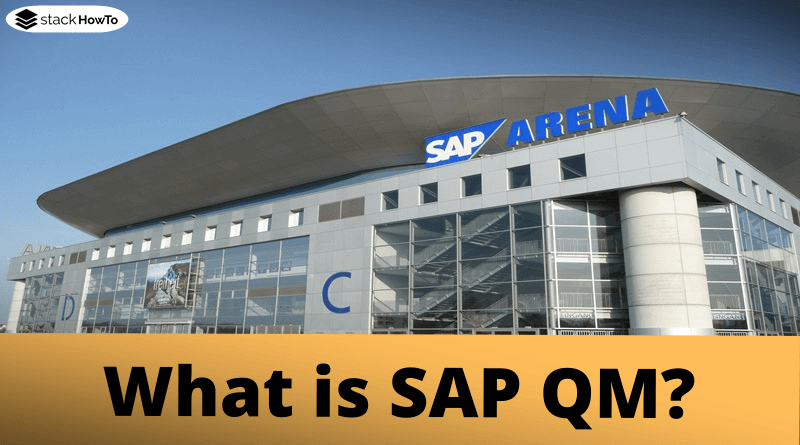What is SAP QM (Quality Management)?
Quality is a decisive success factor for a company’s competitiveness. The competitive pressure increases and the quality demands and customer expectations are getting higher. In order for the company to remain competitive, the quality of its products and services must not only reach a high level but must also be systematically and continuously supported in all operating phases and processes. Quality management software provides the functions required to ensure quality over the entire life cycle. Such software effectively helps in quality improvement and control and is integrated with other management processes of the company.
What is SAP QM?
The quality assurance methods are implemented in the SAP QM (SAP Quality Management) module. The module is a component for the organization and implementation of quality management and quality assurance processes in a company. The SAP QM is the core of the company-wide quality management system and is used in all phases, operational processes, and company areas such as logistics, production, controlling, finance, and human resources.
The SAP QM supports quality assurance, standardization, and certification. This SAP component complements other SAP components functionally – materials management (MM), sales and distribution (SD), plant maintenance (PM), production planning (PP), finance (FI), controlling (CO), Human Resources (HR) – and is integrated with these processes or modules in the overall SAP ERP system.
What functions does SAP QM offer?
SAP QM solves the tasks of quality planning, quality control (testing), quality assurance, and quality control and supports the company in the implementation and execution of these processes. The module takes on the creation of quality certificates, supports problem management with quality reports, and is used in procurement, sales, test planning, and test processing. The important quality assurance methods such as inspection methods, inspection characteristics, and sampling procedures are contained in SAP QM. The software works as a comprehensive quality information system and provides the functions for recording results, recording defects, managing samples, and managing test equipment.
SAP QM offers tools and functions for quality planning (QM-PT), quality inspection (QM-IM), quality certificates (QM-CA), quality notifications (QM-QN), quality control (QM-QC-AQC), and test equipment management (QM-IT). SAP QM helps avoid errors, identify quality defects in good time, optimize processes, and carry out quality control on a regular basis.
What are the advantages of SAP QM?
SAP software is used worldwide and comes from SAP as a leading software manufacturer. The SAP QM is a module of the SAP software and can best be integrated with SAP ERP. The advantages that SAP QM offers a company are diverse and lie in different management tasks, areas, and process levels that SAP QM maps. The advantages are:
- Consistent quality assurance processes
- Integration of systematic and uniform quality assurance in all processes, process phases, and company areas
- Flexible configuration, scalability, and adaptability for every type of operation
- Comprehensive control overall company processes through the seamless integration of quality assurance methods and measures (SAP QM) with all other company areas and processes such as research & development, production, logistics, sales, finance, human resources, controlling, etc. (SAP ERP)
- Support of continuous and consistent quality assurance of the company by linking the quality methods of individual areas and departments into an entire company-wide QM system
- Continuous monitoring of the operating processes with regard to their quality
- Monitoring, checking and controlling the quality parameters
- Automatic quality notifications
- Automated planning of quality inspections
- Maintenance and administration of inspection, test, and laboratory data
- Initiation of the necessary corrective measures through automatic quality reports from the SAP QM system
- Failure analysis, risk minimization, stability studies
- Audit management
- Reduction of failures and delays
- Quality certificates that are part of the product documentation and confirm the quality of the products manufactured and the technologies used
Potential benefits for the company include compliance with quality guidelines and standards, savings in operating costs, and an increase in quality and customer satisfaction. The main advantage of SAP QM is the market-leading SAP system itself, which is used in many companies. The SAP QM module is just one component of the entire SAP system that is integrated with other SAP modules. The company receives a full-featured, company-wide complete solution from one of the world’s leading software manufacturers, SAP.
Like any complex software system, SAP QM not only has advantages but also some disadvantages. The disadvantages of SAP QM are the complexity of the SAP software, high software costs, and high demands on the training of SAP QM staff.
How can you learn SAP QM?
Before purchasing a SAP QM module and using a QM system in the company, a SAP consultant analyzes the profitability, costs, and benefits of the future QM system, participates in the conception, and advises the company management and the specialist departments on all QM-relevant questions to the side. For such activities as a QM consultant, you must have the necessary SAP and QM knowledge. In order to perform the tasks of a SAP QM consultant in a company and to carry them out professionally, you have to complete a SAP training measure or a SAP QM course.
Several SAP QM manuals are available in bookstores that can effectively help you learn the profession and facilitate your entry into the profession. The manuals familiarize you with quality management and QM consulting and use practical examples to explain how to use the SAP QM module for quality management in a company in a goal-oriented, efficient, and successful manner.
How can you earn money with SAP QM?
SAP QM is a popular profession. Qualified SAP QM specialists and experienced SAP experts are in constant demand in the job market. In various online job exchanges and career portals, you will find many vacancies from companies looking for qualified SAP QM consultants. After completing a “SAP QM” training course, you can apply to be a SAP QM consultant/application supervisor at a company. After you have gained practical experience with SAP ERP and SAP QM, you can also work as an external SAP consultant and offer your consulting services as part of SAP quality management.
The earning potential and opportunities for advancement are high in this profession. After a few years of work in this field, the position of “SAP QM Senior Consultant” would be the next step in your career.
Conclusion
Quality becomes a company’s decisive competitive advantage. SAP QM is part of product lifecycle management (PLM) and sets up a company-wide quality information system for sustainable quality control and quality assurance. The SAP QM is an important component of the entire SAP ERP (Enterprise Resource Planning) system. The module is used in different industries and in all corporate areas (production planning, procurement, logistics, sales, laboratory, HR, controlling, service, etc.). The SAP QM is seamlessly integrated with other SAP components and supports the company in ensuring quality at all stages of the production/logistics chain and in all phases of the PLM cycle.
The SAP QM serves as an important instrument for the standardization and certification of the company according to a recognized international quality norm such as ISO 9001. It is to be expected that the importance of quality management and QM consultants who use SAP QM professionally will increase in the next few years.





